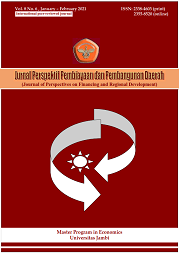How the role of ATM technology encourage financial efficiency on Madura villagers?
DOI:
https://doi.org/10.22437/ppd.v9i1.10629Keywords:
Automatic Teller Machine, Financial efficiency, Stochastic Frontier Analysis, VillagersAbstract
Nowadays, the necessity and utilization of Automatic Teller Machine (ATM) technologies increase in rural areas. Financial technology became a crucial thing and created efficiency in their activities. Some previous research uncovers technology that could create efficiency in the economy, including financial technology. This paper, interest in investigating and detect how ATM technology establishes financial efficiency on villagers. This research was conducted in rural communities on the island of Madura, Indonesia. This study uses SFA (Stochastic Frontier Analysis) model to estimate technical efficiency. This research found out that ATMs in rural communities on Madura Island produce highly financial efficiency. It proved that the villagers in Madura need ATM technology for carrying out their economic activities. Â
Downloads
References
Andhyka, B. N. (2017). Penggunaan BUKU dan Kepemilikan dalam Menganalisis Efisiensi Perbankan di Indonesia. Al Tijarah, 3(2), 1-22.
Arestis, P., Chortareas, G. & Desli, E. (2006). Technical efficiency and financial deepening in the non-OECD economies. International Review of Applied Economics, 20(3), 353–373. https://doi.org/10.1080/02692170600736151
Arnold, J., & Gammage, S. (2019). Gender and financial inclusion: the critical role for holistic programming. Development in Practice, 29(8), 965–973. https://doi.org/10.1080/09614524.2019.1651251
Asongu, S.A., Anyanwu, J.C. & Tchamyou, V.S. (2019). Technology-driven information sharing and conditional financial development in Africa. Information Technology for Development, 25(4), 630–659. https://doi.org/10.1080/02681102. 2017.1311833
Battese, G.E., & Coelli, T.J. (1992), Frontier production functions, technical efficiency and panel data: With application to paddy farmers in India. Journal of Productivity Analysis, 3(1-2), 153-169.
Botti, L., Boubaker, S., Hamrouni, A., & Solonandrasana, B. (2014). Corporate governance efficiency and internet financial reporting quality. Review of Accounting and Finance, 13(1), 43–64. https://doi.org/10.1108/RAF-11-2012-0117
Coelli, T. (1996). A Guide to FRONTIER Version 4.1: A Computer Program for Stochastic Frontier Production and Cost Function Estimation. CEPA Working paper 96/07, Department of Econometrics, University of New England, Australia.
Coelli, T., Rao, D., O’Donnell, C. & Battese, G. (2005) An Introduction to Efficiency and Productivity Analysis. 2nd ed., New York: Springer.
Dogan, N. O., & Tugcu, C. T. (2015). Energy efficiency in electricity production: A data envelopment analysis (DEA) approach for the G-20 countries. International Journal of Energy Economics and Policy, 5(1), 246–252.
Eni, Y., Enjelia, L.T., Putri, J.M. & Sari, F.N. (2020). The Efficiency of Rice Production Analysis in The Western Part of Indonesia By Using Stochastic Frontier Analysis Method ( SFA ). International Journal of Advanced Science and Technology, 29(5), 6154–6165.
Junaedi. (2016). Pengembangan Kapas Rakyat di Sulawesi Selatan. Bandung: CV. Mujahid Press.
Li, H., & Wu, L. (2016). Analysis of financial support efficiency for China’s wind power industry. Energy Sources, Part B: Economics, Planning and Policy, 11(11), 1035–1041. https://doi.org/10.1080/15567249.2016.1185480
Liao, G., Yao, D., & Hu, Z. (2020). The Spatial Effect of the Efficiency of Regional Financial Resource Allocation from the Perspective of Internet Finance: Evidence from Chinese Provinces. Emerging Markets Finance and Trade, 56(6), 1211–1223. https://doi.org/10.1080/1540496X.2018.1564658
Mishkin, Fredric S. & Philip E. Strahan. (1999). What Will Technology Do to Financial Structure?. NBER Working Papers 6892, National Bureau of Economic Research, Inc.
Nourzad, F. (2002). Financial development and productive efficiency: A panel study of developed and developing countries. Journal of Economics and Finance, 26(2), 138–148. https://doi.org/10.1007/BF02755981
Rahaman, A.A. (2016). Stochastic Frontier Analysis (SFA) of technical efficiency, insights from small holder cotton farmers in the Northern Region of Gama. Global Science Reserch Journal, 4(1), 361-267.
Roberts, A. (2015). Gender, Financial deepening and the production of embodied finance: towards a critical feminist analysis. Global Society, 29(1), 107–127. https://doi.org/10.1080/13600826.2014.975189
Romdhane, S. B. (2013). Impact of information technology on the performance of Tunisian banks: A stochastic frontier analysis with panel data. Asian Academy of Management Journal of Accounting and Finance, 9(2), 95–125.
Sadalia, I., Kautsar, M.H., Irawati, N., & Muda, I. (2018). Analysis of the Efficiency Performance of sharia and Conventional Banks Using Stochastic Frontier Analysis. Banks and Bank systems, 13(2), 27-38.
Steward, C., Matousek, R. & Nguyen, T.N. (2016). Efficiency in the Vietnamese banking system: A DEA double bootstrap approach. Research in International Business and Finance, 36, 96-111. https://doi.org/10.1016/j.ribaf.2015.09.006
Sufian, F. (2006). Title The Efficiency of Non-Bank Financial Institutions: Empirical Evidence from Malaysia Centre for Policy Initiatives (CPI). Source International Research Journal of Finance & Economics, 6, 49–65.
Tharp, D.T., Lurtz, M., Mielitz, K.S., Kitces, M., & Ammerman, D.A. (2019). Examining the gender pay gap among financial planning professionals: A Blinderâ€Oaxaca decomposition. Financial Planning Review, 2(3–4), 1–20. https://doi.org/10.1002/cfp2.1061
Turvey, C. G., & Xiong, X. (2017). Financial inclusion, financial education, and e-commerce in rural china. Agribusiness, 33(2), 279–285. https://doi.org/ 10.1002/agr.21503
Woldmariam, M. F., Ghinea, G., Atnafu, S., & Groenli, T-M. (2016). Monetary Practices of Traditional Rural Communities in Ethiopia: Implications for New Financial Technology Design. Human-Computer Interaction, 31(6), 473–517. https://doi.org/10.1080/07370024.2016.1139461
Yobe, C.L., Ferrer, S.R.D., & Mudhara, M. (2020). Measuring the financial efficiency of agricultural cooperatives in South Africa: an application of the Simar–Wilson methodology. Agrekon, 0(0), 1–18. https://doi.org/10.1080/03031853.2020. 1761845
Zuhroh, I., Ismail, M. & Maskie, G. (2015).Cost Efficiency of Islamic Banks in Indonesia – A Stochastic Frontier Analysis. Procedia-Social and Behaviour Science 211. DOI: 10.1016/j.sbspro.2015.11.150.
Downloads
Published
How to Cite
Issue
Section
License
Copyright (c) 2021 Alifah Rokhmah Idialis, Sariyani Sariyani, Ayu Delawati Prasetyoningtyas, Roechainy Kartika Ulfa

This work is licensed under a Creative Commons Attribution 4.0 International License.

















